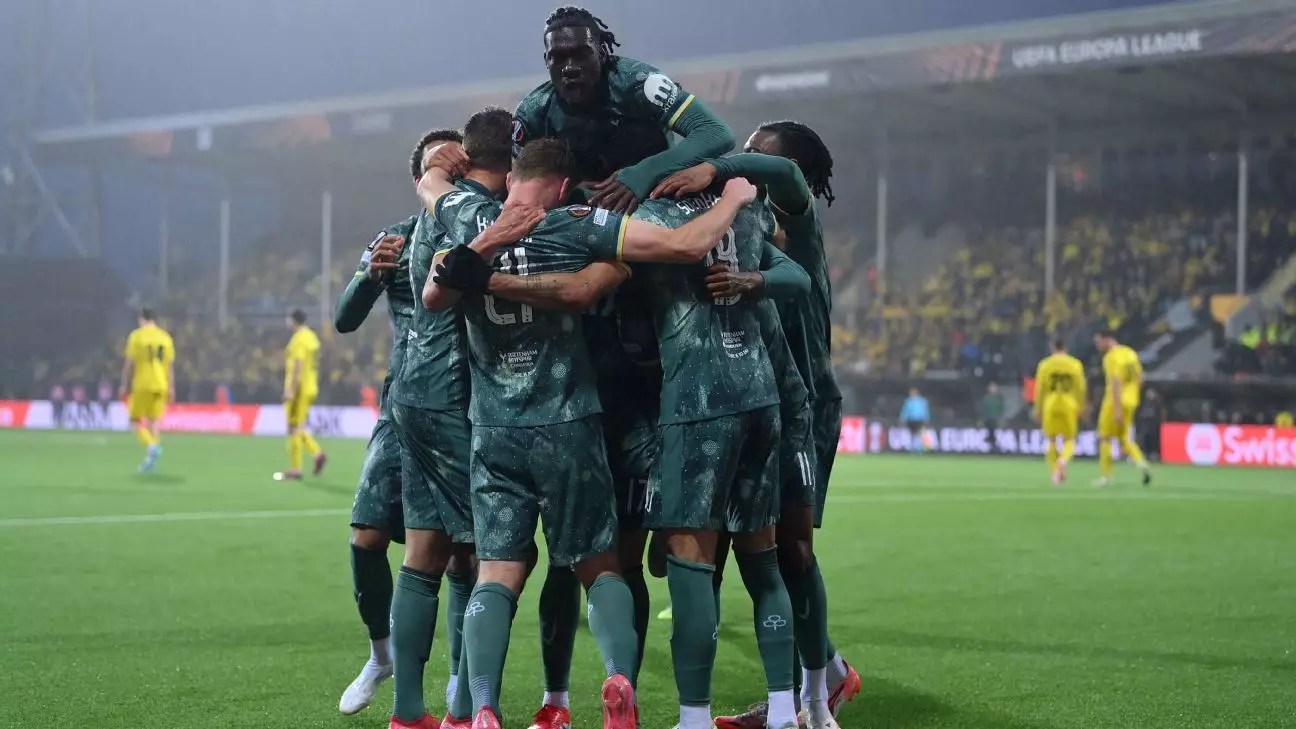Ange Postecoglou arrived at Tottenham Hotspur amidst a swirl of skepticism and hope in equal measure. The specter of the term “Spursy” loomed large over the North London club, a haunting reflection of their inconsistent performances in crucial moments. From the outset of his tenure nearly two years ago, Postecoglou committed to dispelling this curse—a promise of transformation that many doubted could be fulfilled. The latest chapter in this saga unfolds with Spurs advancing to the UEFA Europa League final, defying the very narrative that taints their reputation. This dramatic turnaround isn’t merely a victory on the pitch; it symbolizes a fundamental shift in both ethos and execution.
Defying the Odds
To reach the final, Tottenham faced Bodø/Glimt in what many deemed an uphill battle given the Norwegians’ formidable home record. Yet, Postecoglou’s side transformed this daunting obstacle into a benchmark of professionalism and tactical discipline. With a commanding 5-1 aggregate victory over Manchester United in the previous round, Spurs exemplified a newfound poise that accentuated their growth under Postecoglou’s guidance. The very notion that Spurs could rise above their narrative haunted them, and yet they did just that, showcasing a blend of strategic defense and tactical execution that left little room for doubt.
In the semifinal match, the Spurs exhibited a level of control that was previously alien to them. Rather than succumb to the usual dramatic flair or spectacular failures typical of their past, they approached the game methodically, evoking images of a well-oiled machine rather than the chaotic artistry often celebrated but seldom rewarded. The players executed their game plan with precision, culminating in an unremarkable first half that bore no resemblance to historic “spursy” collapses.
A Tactical Revelation
The conservative approach in the second leg was a deliberate strategy. This pragmatic methodology starkly contrasts Postecoglou’s earlier tenure, where high-risk, high-reward football often drew criticism for being overly chaotic. It appears the Australian manager has adeptly evolved his strategy, focusing not just on flamboyance but implementing a structure that appraises results above spectacle. The characteristic unpredictability that once plagued Tottenham now seems to be giving way to a disciplined resolve.
Postecoglou’s transformation is not merely a tactical adjustment; it’s a philosophical shift as well. His defense-first mentality took center stage, showcasing players who embraced responsibilities previously shunned under more cavalier setups. The clean sheet against Bodø/Glimt wasn’t just a defensive triumph; it was emblematic of a team learning to embrace both sides of the game—a significant deviation from the “all or nothing” approach of yesteryear.
Success Reduced to Titles
Yet, while Postecoglou orchestrates this transformation, the paradox of modern football emerges: success is often distilled to silverware. His acknowledgment that league standings do not define the merit of the team’s accomplishments was a poignant affirmation of a broader reality. The juxtaposition of a cup run against a languishing league position eloquently illustrates the complexities of football, where narratives fail to capture the nuanced evolution of teams and managers.
As Spurs grapple with their historical struggles, the importance of winning tangible rewards cannot be understated. Postecoglou’s assertion that achieving a trophy would be the ultimate testament to the team’s journey reflects not just ambition, but an understanding of expectations associated with the club’s illustrious past. It’s a reminder that greatness in football does not merely rest upon a legacy of near-misses and unfulfilled potential—it demands tangible victories.
Rivalries and Resilience
Postecoglou’s comments about the rivalry with Manchester United are significant to this discussion. Having bested the Red Devils multiple times over one season, Postecoglou has shamed the narrative of entitlement associated with traditional powerhouses. Tottenham’s triumphs against United, particularly after some nerve-racking encounters, are emblematic of a team learning how to manage pressure and seize opportunities rather than succumb to the weight of expectations. Each victory has not only emboldened their resolve but has also served as a rebuke to the critics who label them “easy targets.”
While the road ahead remains uncertain and filled with hurdles, Postecoglou stands firm in his commitment to reshape Tottenham’s identity. He is pointedly aware that it is not enough to merely aspire for respect; the path to legitimacy is paved with hard-fought victories. The title of a major competition is within reach, and as Spurs edge closer to that coveted trophy, they are simultaneously on the brink of rewriting the narrative that has long shackled them.
In this grand theater of football, where legends are crafted by silverware, Postecoglou is weaving a new narrative—one that champions not just resilience and grit, but one that has the potential to dismantle the very labels that have haunted Tottenham Hotspur for decades. The journey continues, and it may very well end with a new dawn and a new consensus: Tottenham is not just a team of potential; they are a team on the brink of greatness.


Leave a Reply